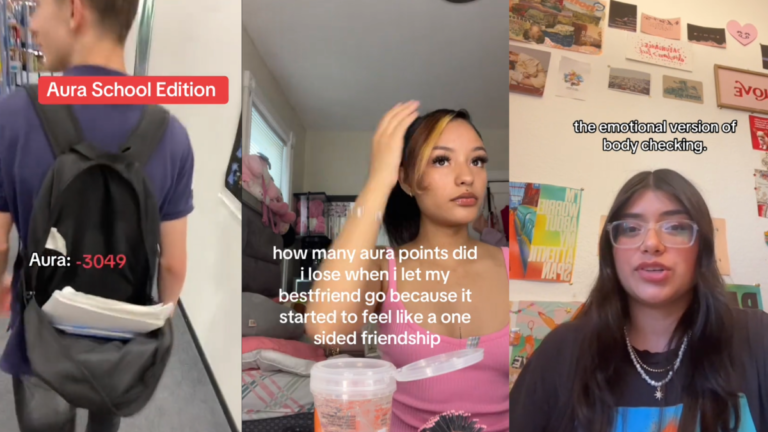What if you wave at someone who doesn’t wave at you? Minus 1,000 aura points. What if you throw your trash in the recycling bin instead of the trash? Plus 500 aura points.
A new social media trend popular among teens on TikTok lets users rank their coolness (or lack thereof). There are no set rules or official points system, and users are responsible for scoring themselves, so points gained or lost can vary wildly. It’s all about the vibe.
By scrutinizing their every action and creating an imaginary points system for each decision, young people can take control of difficult moments in their lives and redeem themselves in the eyes of their peers — but doing so can come at the expense of their mental health, experts say.
What are “Aura Points”?
Sunny Grace, a high school student known on TikTok as @sunntie, recently shared the “worst ways to lose your aura at school.” Her aura fails included cramping in class (-1,500 points), walking with an open backpack (-988 points), and falling down the stairs on a bus (-99999999 points). The video has garnered over 26 million views and 13,000 comments, most of which are from people sharing embarrassing aura deductions like “bumping into a desk while walking down an aisle” or “having their stomach growl during a test.”
She explained how to “revive” your aura after a long day of losing points, which were accumulated by performing mysterious acts in hallways (+2500 points), executing the perfect dodge-up (+755 points), and tripping while avoiding it (+10,000,000 points).
Aura was first used in 2018 in meme form as a ranking system of personality traits: “Weak aura vs. strong aura.” Listening to Apple Music revealed a weak aura, while using Spotify was a sign of a strong aura. In 2020, a New York Times article about Liverpool soccer star Virgil van Dijk wrote, “Van Dijk’s mistakes are negligible because, basically, he has an aura,” leading to the use of “aura” as a term to describe a person’s cool factor. The term migrated to TikTok in a video about van Dijk posted in April 2023. The trend has since evolved beyond the sports world to capture a certain X-factor that someone has (or doesn’t have).
Today, the most common use of “aura” is to describe everyday awkwardness.
In another version of the trend, called “How many aura points have you lost?”, TikTok users ask others to give them aura points, but instead of low-risk, “embarrassing” experiences, they share more serious ones, like breaking up with a best friend or staying in a toxic relationship.
Expert opinion
Esther Fernandez, the Gen Z face of the mental health nonprofit Made of Millions, likens aura to body scrubbing — the compulsive act of examining and measuring one’s weight, size, and shape. She worries that the trend, regardless of its form, will force young people to present themselves as “cool,” leaving no trace of authenticity.
Dr. Barbara Greenberg, a teen, adolescent, child, and family psychologist, agrees. “I think it’s now a socially acceptable way for teens to seek attention for praise and good-natured humor,” Dr. Greenberg says. “They’re getting whatever attention they want.”
Greenberg said it’s not yet clear how much pressure aura points will place on teenagers, but the trend does shed light on what’s going on inside Gen Z and Gen Alpha. [reflects] “We see how self-conscious teenagers are and how they want to fit in,” Greenberg said. “Hopefully that doesn’t lead to excessive social comparison and excessive self-monitoring.”
Aura points could be adding an additional stressor to an already stressful childhood and school life, Jamie Cohen, a digital culture expert and assistant professor of media studies at Queens College, City University of New York, tells Yahoo Life. “Like most trends, [aura points] “This trend is likely to continue, but it’s essentially an adaptation of social status to everyday life,” Cohen says. “Kids may prioritize how they are perceived over being themselves.”
To Cohen, the trend feels like a way to make social rankings broader and more calculable, which takes on some darker implications: “Because the word ‘points’ suggests scorekeeping, Aura Points could easily be called ‘Aura Rankings,’ and that would get really dystopian.Black Mirror,” Cohen feels that the points system could lead to performance anxiety and change how participants interact with the world.
“Being childish and weird and awkward is part of growing up. … Play and creativity are important parts of childhood, and the weight of aura points can have a negative impact on young people, especially vulnerable people who are forming their identities in real time,” Cohen says. “Parents should talk to their kids about this and remind them that they are perfect just the way they are and that aura points are just a fad.”
Cohen says this isn’t all bad, as it helps young people gauge their own self-worth. “Aura is technically the energy we give off, so perceiving someone siphoning your energy or aura should be perceived as a negative thing that can be countered by being good and preserving your aura,” Cohen says. Greenberg adds that the trend may just be a casual game between teenagers and their peers. “Teenagers who post seem to be doing so voluntarily and having fun,” she says.

